India rejects "deeply biased" US report on international religious freedom
Jaiswal further criticised the report for its "selective use of facts" and reliance on biased sources. "The excise itself is a mix of imputations, misrepresentations, selective usage of facts, reliance on biased sources, and a one-sided projection of issues," he added;

New Delhi: India has categorically rejected the US State Department's 2023 report on international religious freedom as "deeply biased" and lacking understanding of India's social dynamics.
The Ministry of External Affairs (MEA) condemned the report, accusing it of being driven by "votebank considerations" and maintaining a prescriptive outlook.
"We have noted the release by the US State Department of its report on international religious Freedom for 2023. As in the past, the report is deeply biased, lacks an understanding of India's social fabric, and is visibly driven by vote bank considerations and a prescriptive outlook. We therefore reject it," stated MEA official spokesperson Randhir Jaiswal on Friday, addressing a weekly briefing.
Jaiswal further criticised the report for its "selective use of facts" and reliance on biased sources. "The excise itself is a mix of imputations, misrepresentations, selective usage of facts, reliance on biased sources, and a one-sided projection of issues," he added.
He noted the report questions validity of Indian laws and regulations, including those aimed at monitoring financial flows and ensuring compliance, which India sees as essential for national security.
"This extends even to the depiction of our constitutional provisions and duly enacted laws of India. It has selectively picked incidents to advance a preconceived narrative as well. In some cases, the very validity of laws and regulations are questioned by the report, as are the right of legislatures to enact them. The report also appears to challenge the integrity of certain legal judgments given by Indian courts," Jaiswal added.
"The report has also targeted regulations that monitor the misuse of financial flows into India, suggesting that the burden of compliance is unreasonable. It seeks to question the need for such measures," he said.
India also underscored that human rights and diversity remain subjects of legitimate discussion between the two nations. However, Jaiswal emphasised that such dialogue should not be misconstrued as a pretext for foreign interference in domestic affairs.
"In 2023, India has officially taken up numerous cases in the US of hate crimes, racial attacks on Indian nationals and other minorities, vandalisation and targeting of places of worship, violence and mistreatment by law enforcement authorities, as well as according to political space to advocates of extremism and terrorism abroad," Jaiswal pointed out.
The United States' yearly report on global religious freedom has expressed worries regarding India's anti-conversion laws, incidents of hate speech, and alleged demolitions of residences and religious sites belonging to minority communities.
Releasing the 2023 Report on International Religious Freedom early this week, US Secretary of State Antony Blinken has said, "Today, governments around the world continue to target individuals, shutter places of worship, forcibly displace communities, and imprison people because of their religious beliefs."
Talking about India, he added, "In India, we see a concerning increase in anti-conversion laws, hate speech, demolitions of homes and places of worship for members of minority faith communities."
He noted that in the United States, there has been a significant increase in reports of hate crimes and other incidents specifically targeting Muslims and Jews.

